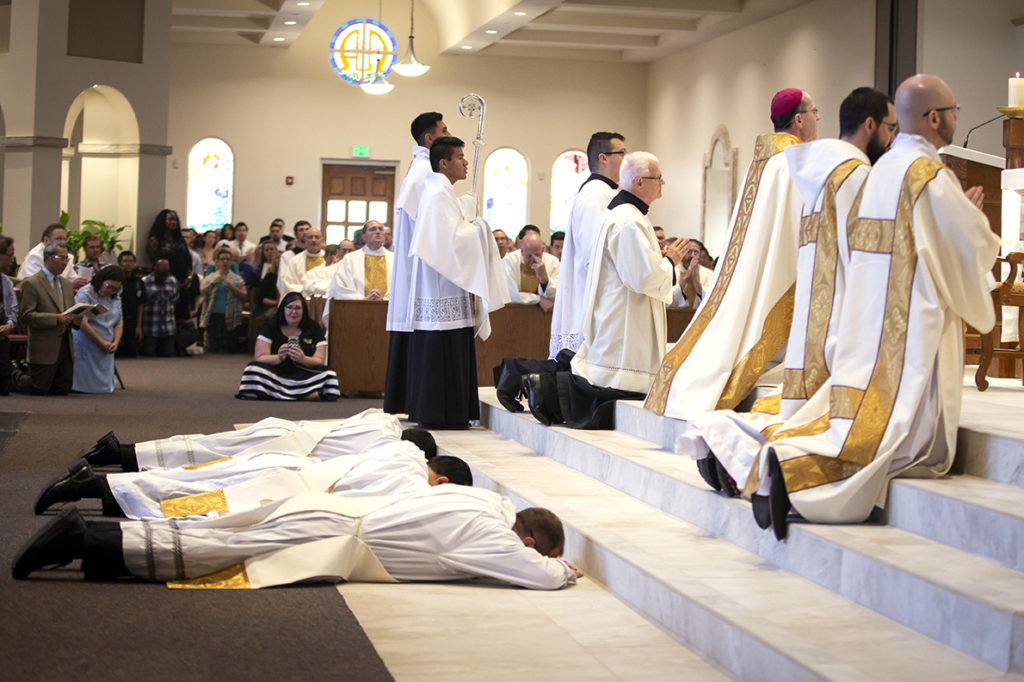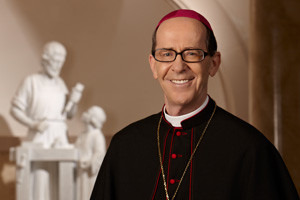

Holy, Yet Needing Purification
Third in a Series
In my previous articles, I began to look at the current crisis in the Church resulting from the sins of priests and bishops. Since then, Pope Francis held a meeting of Church leadership from around the world to address the underlying causes that allow for such scandal.
As I indicated before, some failures of Church leadership in the seminary formation of future priests sadly allowed for such scandals. I would like now to consider some key questions about the priesthood, which must be kept in mind when correcting past failures.
There are many questions, criticisms and misunderstandings of the priesthood today, perhaps especially in the wake of the scandals. These include whether celibacy is healthy, the limiting of the priesthood to men and even why the Church does not admit men who self-identify as homosexual to enter seminary.
Priestly identity

To understand what Christ gave to His Church at the Last Supper, we must first consider the identity of the priest. Like the identity of all Christians, we are not merely people who follow the commandments and the sacramental life as Jesus taught, we are above all beloved sons and daughters of God the Father through our Baptism in Christ. The power of the Holy Spirit penetrates far beyond our actions to our very identity.
A priest is not one who simply serves by consecrating, anointing and blessing amidst other ministerial functions. A priest is united to Christ at the level of his identity. As the Ordination Rite states, he is “configured to Christ the eternal High Priest” and so the Church, in her unbroken tradition, refers to him as Alter Christus, another Christ. St. John Paul II said a priest is a “sacramental representation of Christ” who is shepherd, servant, spouse of the Church, high priest and the one who shows us the Father. Or, as Pope Emeritus Benedict XVI says, “we are always priests with all our soul and with all our heart. Being an ambassador of Christ … is a mission that penetrates our entire being.”
The priesthood, already established in the Old Testament and fulfilled in Jesus Christ, is divinely inspired. If one were to consider the priesthood to be merely a job or simply the bestowal of an honor, as opposed to a vocation to service, one would completely miss the essence of the priesthood.
The male priesthood
Since the establishment of the rituals spoken of in the first books of the Bible, the Torah, we see that God called men to serve in the role of priests. For example, God is clear in how Moses was to teach Aaron and his sons how to give priestly blessings (Cf. Nm 6) and to make the sacrificial offerings (Cf. Ex 28–29). In the life of our Lord, we not only see that this very priesthood continued, we also see that He submitted Himself to that priesthood in the context of the Jewish liturgical life, the covenants and the Temple of Jerusalem. Jesus, the Son of the Father, would establish the “new and everlasting covenant” that would be carried out and passed on by the men He chose to be His Apostles. It is this establishment of the priesthood that we have received and trusted ever since.
St. John Paul II wrote about “the example recorded in the Sacred Scriptures of Christ choosing His Apostles only from among men; the constant practice of the Church, which has imitated Christ in choosing only men; and her living teaching authority which has consistently held that the exclusion of women from the priesthood is in accordance with God’s plan for His Church” (“Ordinatio Sacerdotalis” 1).
This is not saying that men are superior or that women are unworthy. Who could be worthier than the Mother of Jesus? What it is saying is that Christ established things in this way and that we trust He acted freely with our good in mind, even if many may not understand it completely.
At the same time, we do not do this based on authority alone; deeper reasons also support it. It is not accidental that Jesus embraced truly masculine roles in revealing the Father and in being the loving bridegroom of the Church. Masculinity is essential to the priesthood of Jesus Christ.
The priest as chaste spouse
A candidate for the priesthood is called to be healthy and mature, capable of truly caring for the good of Christ’s flock, called as Jesus Himself “to serve and not to be served” (Mt 20:28). Such a capacity is referred to by the Church as “affective maturity.” This ability to live in true and responsible love is a decisive factor in discerning a candidate for the priesthood. He needs the ability to balance his feelings and integrate them in his relationship with Christ. Only such a man can be the stable and compassionate presence of Christ in the often-intense moments of joy and sorrow of those whom he serves.
This affective maturity certainly includes his sexuality following the example of Jesus. “Sexuality … is not something simply biological but concerns the innermost being of the human person as such,” says the Catechism of the Catholic Church, and is “ordered to the conjugal love of man and woman” (CCC 2360-2361). The virtue of chastity allows celibacy or marriage to be lived out well as one embraces the gift of masculinity or femininity. When considering the recent scandals, we see that celibacy is not the key issue; chastity is. A man who lives out his calling to be a spiritual father and faithful spouse of the Church in a chaste way, far from being a cause of scandals, brings a particularly needed witness to our culture as he lives that mature love united to Christ.
It is in this context that we can take up the question of homosexuality and the priesthood. The priesthood requires masculine spousal love for the Church, the Bride of Christ. For this reason, the Congregation for Clergy, under Pope Francis, reiterated in 2016 that “while profoundly respecting the persons in question, [the Church] cannot admit to the seminary or to holy orders those who practice homosexuality, present deep-seated homosexual tendencies or support the so-called ‘gay culture.’”
The Church’s teaching about the essence of the priesthood is clear. It cannot be reduced to a mere function that anyone can do (homosexual or female) because it is a deeper reality. If the priesthood is configured to Christ, then it is sustained by that “‘knowledge of love’ which can only be learned in a ‘heart to heart’ with Christ. Indeed, it is He who calls us to break the Bread of His love, to forgive sins and to guide the flock in His name. For this very reason we must never distance ourselves from the source of Love, which is His Heart that was pierced on the Cross” (Pope Benedict XVI).
Dear friends in Christ, I invite you to pray for me and especially for my sons and brothers who are currently priests. Not simply for their health and well-being, but that they be closely united to Jesus in that heart to heart union as they serve faithfully in our parishes.





